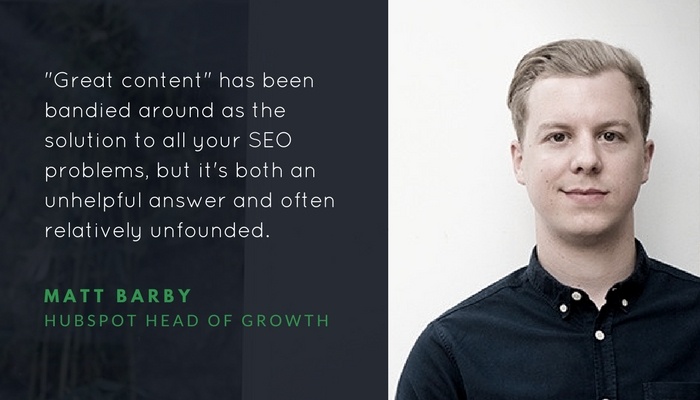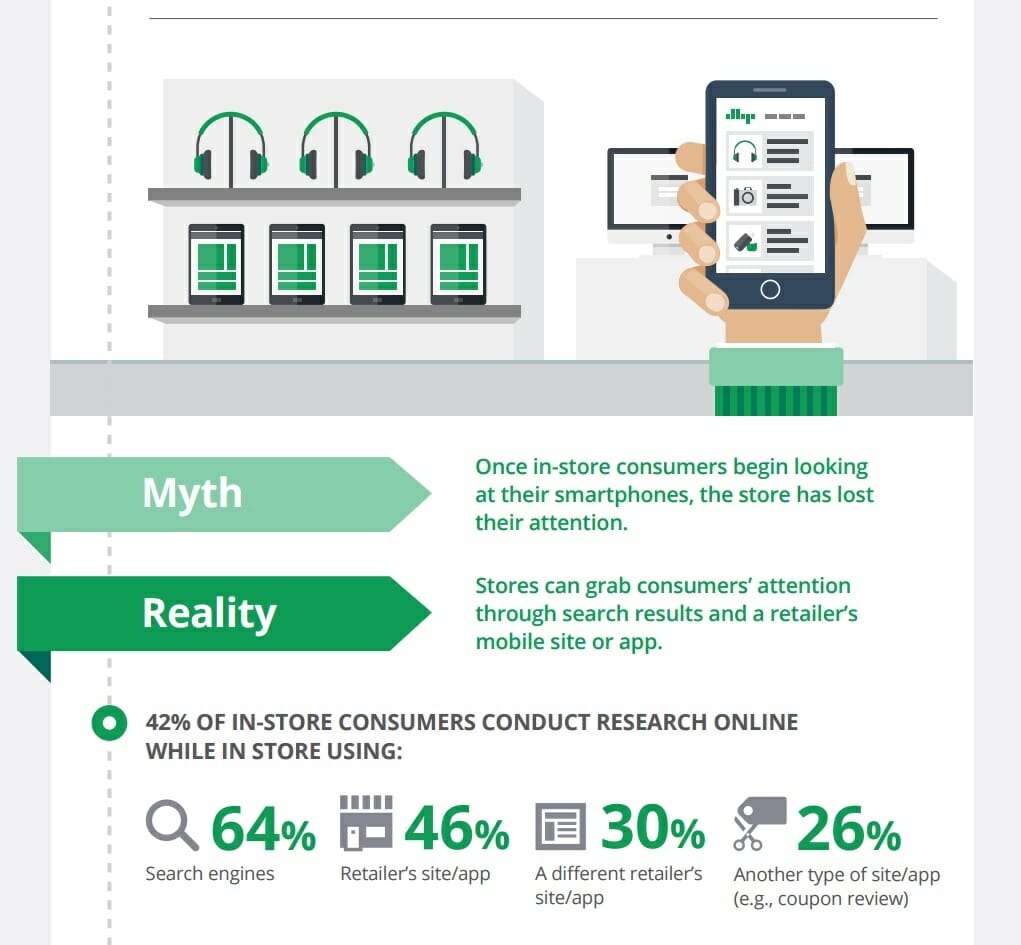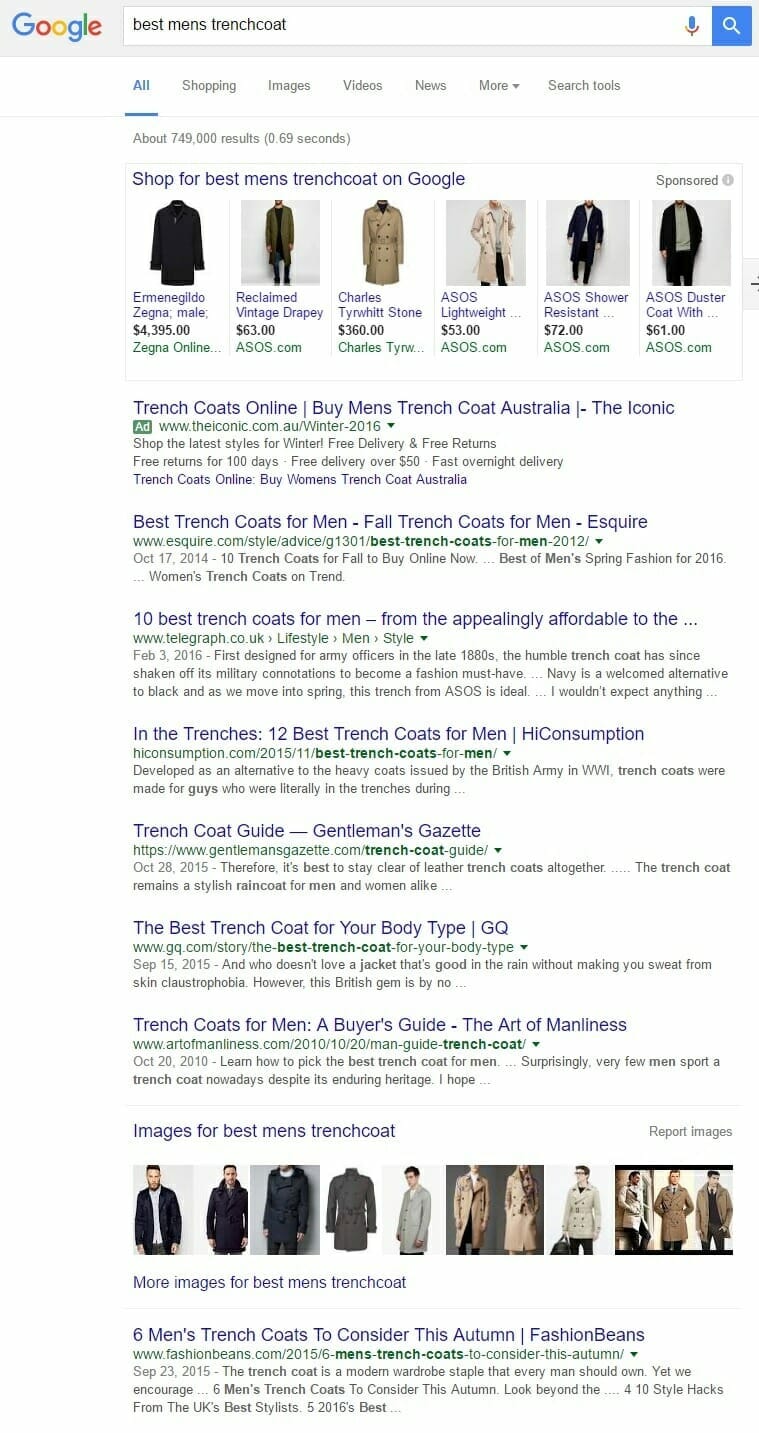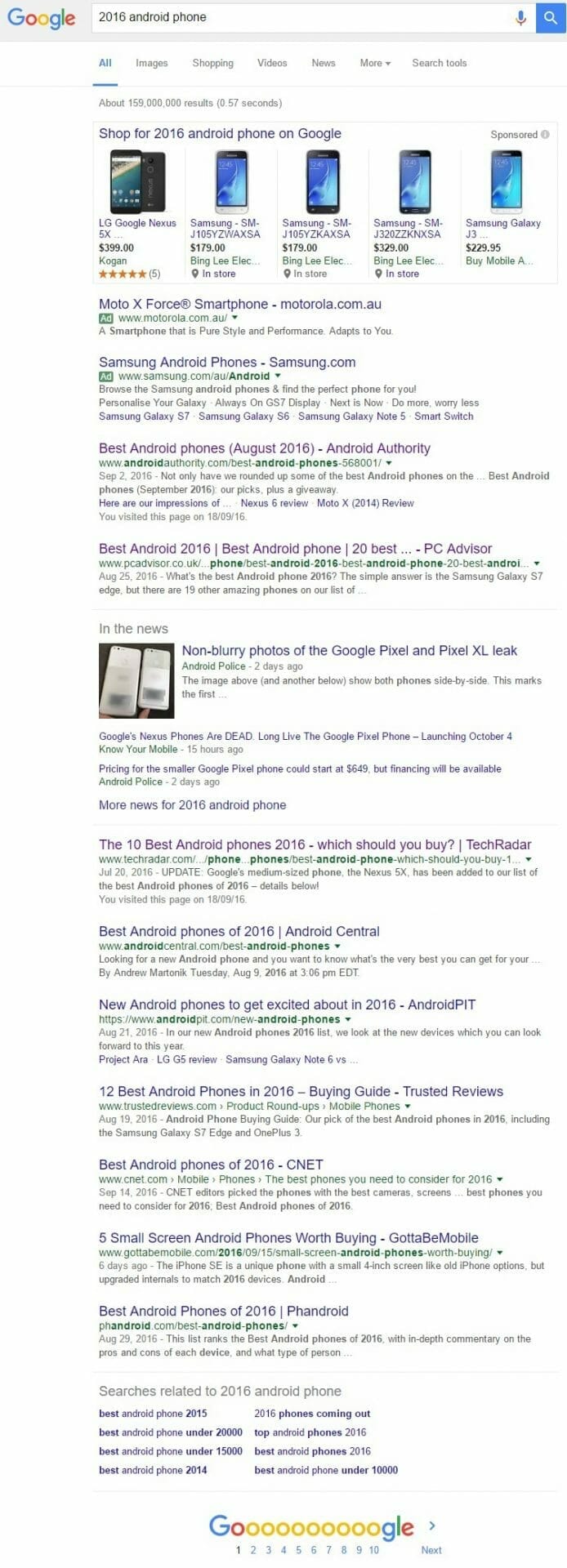The two words on every ecommerce marketing professional’s lips (and Twitter feed) this year are content marketing.
And the three letters on everyone’s blacklist are S-E-O.
Anyone selling online understands the value of attracting more potential customers through search engine referrals.
But Google is a scary, confusing beast, and SEO can seem more like a dangerous dark art than a digital marketing discipline.
The term ‘content marketing’ is more than just another empty buzzword – and its practice might just help your business dominate Google page one.
- So what does this content marketing caper have to do with SEO?
- Will it live up to the talk generated by the infamous marketing industry hype-mongers?
- And why is content marketing so important for ecommerce brands in particular?
These are new, confusing and often nerve-wracking questions for online retailers – but I really don’t want to see you looking like this guy every time someone brings up these terms in the office…

Lower those anxiety levels.
Prepare to wipe that furrowed brow free of your confusion-induced sweat.
It’s time to separate the frenzied hysteria from the balanced insight.
The ecommerce marketing jungle is not quite as scary as it seems.
You’ll leave this article with a solid understanding of the impact content marketing can have on your search engine rankings, and your bottom line.
Short On Time? Your Skim-Read Summary:
Too busy to read the whole thing? We get it: logistics, synergies, KPI’s – all that stuff. Here’s the skim read version. You really should read the whole article, though…
You can click on the dot point that takes your fancy and head straight to the relevant section.
SEO’s democratisation makes content marketing critical for online stores
SEO knowledge used to serve as dictator. Now the number one search engine spot is a close as ever to democracy.
In years gone by, the battle for a page one Google ranking was fought based on your knowledge of SEO tactics and techniques. Those who knew how to game the system won out.
Having the best content for the searcher was not good enough.
No matter the quality of your store’s user experience, the depth of your product page information, or the speed of your website – it was your knowledge of the technical tricks and tactics of SEO that determined your likelihood of reaching page one.
Quality-focused marketing pro’s are rejoicing the end of this era. Google’s continual algorithm updates now reward the most valuable content – not just the most optimised.
If your content is deemed the most relevant and important, you’ll find yourself at the top.
Relevancy and importance is determined in no small part by Google’s version of the popular vote – and the page one election is now a hard one to rig.
Great content helps. But this not enough to make sure you attract the maximum amount of potential customers.
Search engines still hold the key to unlock the door to the researchers of the online world, and to make it to number 1 – quality content alone just isn’t enough.
Hubspot’s Head of Growth, Matt Barby has my back on this one.

Great content alone probably won’t work.
Great SEO alone probably won’t work.
Great content properly optimised for Google and co. is what you need to maximise your search engine referral traffic.
So that means your ecommerce brand’s best passage to Google page one is now to create and promote content your customers will love.
There’s no shortcuts any more.
If your content doesn’t help your customers, search engines will have a really hard time recommending it.
You need to consistently create content worthy of attracting, converting and retaining customers, AND you need to know how to get that content in front of the right people.
The process of achieving both of these goals is content marketing.
Here’s the formal definition of the practice, courtesy of the Content Marketing Institute:
“Content marketing is the marketing and business process for creating and distributing relevant and valuable content to attract, acquire, and engage a clearly defined and understood target audience – with the objective of driving profitable customer action.”
Putting the business textbook away, here’s the real world, jargon-free explanation of content marketing for those new to concept:
“Your customers don’t care about you, your products, your services… they care about themselves, their wants and their needs.
Content marketing is about creating interesting information your customers are passionate about – so they actually pay attention to you.”
SEO and content are the ecommerce industry’s version of the chicken and the egg.
Good content needs good SEO and good SEO needs good content.
As Head of Digital at ICM Partners (and former Buzzfeed VP) Jonathan Perelman suggests, ‘Content is king, but distribution is queen and she wears the pants.’
That’s why content marketing and SEO are so critically linked (pun intended).
Why content marketing is an ecommerce manager’s best friend
Ecommerce brands are digital natives.
Online retail pro’s recognise the importance of attracting and retaining a like-minded niche audience.
Fast ecommerce growth demands quick acquisition and repeat sales.
Lifetime customer value should be an ecommerce manager’s most important metric.
Ecommerce business owners are starting to focus on providing real value to customers, to help grow online store traffic and develop a tribe of loyal brand fans.
“Valuable Content” – whether it be blog posts, downloadable guides, video series, podcasts, product reviews, forums, infographics, magazines, *deep breath*, the list goes on – helps to educate, inform and entertain customers.
Forward thinking ecommerce brands are reaping the rewards of a customer-delighting content marketing strategy.
The old timey ‘speak to a real guy in a shop’ method of customer service is gone.
We all research purchases online. Even when we shop in a physical store, most of us crave digital helpfulness to assure us of a purchase.

Let’s use the homewares industry to illustrate the importance of quality ecommerce content marketing.
Consider how valuable content can help an online retailer dominate search, and generate more add-to-cart-moments:
- If we are researching a problem (“how to re-upholster your couch”) – we might download an ebook or look for a YouTube explainer vid.
- If we are interested in a given topic area (maybe “current interior design trends”) – we might come across a blog article, info guide, or onsite image gallery.
- If we’re ready to compare alternatives before we buy (“best dining room tables”) – we’ll look for reviews, buyer’s guides or detailed product specifications.
- If we want reassurance about an online purchase (“leather couch delivery Downtown area”) – we search specifically for shipping, returns, and warranties information.
We get that people do these things. Regularly.
If our business can be there with content to help these online researchers – we have a much better chance of gaining their trust and their add-to-cart click.
Proof your content marketing strategy will boost your SEO performance
Helpful, valuable content is most likely to attract, convert and retain customers AND it’s more likely to rank number one on Google.
Content marketing optimised for search engines gives ecommerce brands the chance to swoop in and earn your target’s trust at the research phase.
Google wants to give researching users the most relevant and important information. Your product and category pages probably aren’t going to outrank detailed buyer’s guides, comparison reviews or expert analysis in the ‘researcher helpfulness’ stakes.
I want to give you two examples to illustrate my point.
I’ve pulled together the page one Google search results for a couple of broad, research-based keyphrases. Both terms imply purchase intent, but in each case the searcher is probably looking for more information to help them make a decision.
In both cases, you’ll notice that helpful, valuable content focused on the audience’s needs wins out over the perfectly optimised product or category page of leading retailers.
#1. “best mens trenchcoat’

Can you see the trend here?
Apart from the Sponsored Google Shopping ads, and the traditional Google Adwords ad – every ranked article is either a blog article or a buyer’s guide.
No ecommerce product or category page in site.
#2. “2016 android phone”

Once again, apart from the paid placements, page one is dominated by those websites with the most valuable, informative and interesting content.
Helpfulness wins out.
There’s no reason why your brand can’t develop the most helpful, valuable content in your niche.
Even the youngest of startups (like Beardbrand), with the thinnest of budgets (like Frank Body), and the smallest of niches (like Goulet Pens) can attract a huge tribe of potential customers to their online store with a content marketing approach to SEO. You can start by turning your online store’s content into a virtual shop assistant.
If you can convert your interested audience into email subscribers, you can nurture and develop your relationship over time.
When you keep sending consistent, valuable content – you’re banking up brownie points with your potential customer.
When they’re ready to buy, they are buying from you. Opting for a competitor would feel like adultery.
That’s why content marketing presents such an enormous opportunity for online businesses.
Apart from boosting rankings, you can make marketing your customers want
Instead of interrupting the masses, content marketing helps you meet and greet potential customers with genuine value.
Sure, advertising can still work. Unfortunately, it’s often expensive, uninvited and ineffective.
An effective content marketing program allows online retailers to attract, convert and retain their own audience – without having to continually outlay ad dollars to speak to them.
And it’s not just blogging that can build an audience for your ecommerce store.
Your brand can create the best publication in your subject matter area.
Here’s just a few ripping examples from ecommerce brands who have built profitable audiences with content every bit as good as the leading publisher in their niche:
This audience-delighting content does more than poll well in Google’s page one elections – it proves to your online shoppers how much you care.
You’re not just shouting sales promotions from your online marketing megaphone. Your content is adding genuine value outside of your products and services.
Remember, content marketing is a marathon – not a sprint

This content marketing thing probably sounds too good to be true.
In reality, generating sustainable ecommerce success with this approach is not easy.
Developing the skills, processes and structures required for your content marketing program is difficult. Loyal subscribers don’t come quickly. Developing an audience takes at least 6 months of consistent, quality publishing.
If it were easy, everyone would be doing it.
Instead, so many marketing pro’s dipping their toe in the content marketing ocean are expecting immediate results.
In the old Don Draper days we could throw up an ad on the radio or roll out a campaign on TV and watch our sales improve, at least temporarily.
Now we’re not only competing with the guy across the street, we’re competing with the entire world – and the competition is fierce.

Great promotional campaigns can be executed quickly, but without a consistent approach and a long term strategy, your gains are finite. You’re left forever striving for the next ‘quick win’.
Great content marketing is consistent and never-ending. There’s no end date. It’s a program not a campaign. Every part of your business, every piece of content you create, every member in your team should work together to snowball your momentum. The more value you provide, the greater your return on investment will be.
Sure, it’s often lots of work for little reward in the first few months, but the rewards are exponential in the future.
Unlike the ad campaign you just paid for, the same blog post you create today can still be attracting new customers for years into the future.
It’s like investing your money in buying a house, rather than continually shelling out for the next season’s Louis Vuitton.
Content marketing is a compounding investment in valuable business assets
Content marketing is like an online version of your friendly customer service assistant from years gone by. Only better.
It has a 24/7 shift and it can help, educate or entertain millions of customers at the same time.
The content you create can be repackaged and used for a multitude of marketing tactics, not just improving your SEO and website traffic.
That “Ultimate Guide to Your Product” you create would be just as effective as an after-sales service aid, a series of instructional blog posts, an explainer video series, or a downloadable PDF.
You get more out of your creation effort and you help more customers in the process.
A couple of isolated efforts won’t move mountains. You need time to build up your snowball – but the publication or library you grow will be exponentially more powerful than the sum of its parts.

Now is the time to use content to dominate Google and grow your own audience of repeat customers
If you want to win online, you need to create consistently valuable content and build your own audience of loyal customers.
The combination of genuinely useful content, and quality optimisation tactics is the mixture you need to attract customers to your online store.
There’s an internal fortitude required for an online retailer to forgo the surety of a small short term jump in profit at the expense of the potential long term game-changer. And some patience. Oh, and throw in a whole lot of planning, dedication and hard work.
Those brave enough to hitch a ride on the bandwagon now will have a much more comfortable ride.
You don’t want to be the chump hanging off the back.